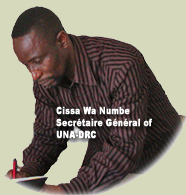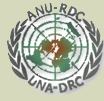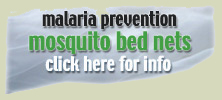Letter from SG UNA / Overview / Objectives / Research Findings / UNA Background /
Malaria Prevention Mission Given to UNA /Strategic Actions / Programme / Activities /
Contact / Support this Campaign
For Our Corporate Sponsors, Foundations, Universities
Details of UNA-DRC's
The following is a letter from Dr. Cissa Wa Numbe, |
|
In October 2007, "We visited Baraka - Fizi Territory, one of the areas ravaged and destroyed by civil war and violent armed conflicts of Kivu provinces. In that part of the country, now recovering from conflict, thousands of internally displaced people and refugees are now returning home after spending years in exile and in refuge areas. In these areas as well as in Bukavu and Goma, we have been very touched by the effect of malaria disease which requires an emergency provision of insecticide-treated mosquito bed-nets as a measure of preventing and controlling malaria disease that is severally affecting thousands of lives and causing poverty to become worse. Consequently UNA has developed and is now leading an emergency appeal for insecticide-treated mosquito bed-nets to be distributed as a pilot project to four villages (Mboko-Baraka in Fizi territory, Uvira, Bukavu and Sake in Goma) with the possibility of expanding the project in other villages where communities of internally displaced people, including refugees, women and girls (victims of rape and sexual violence), and children (forcibly recruited as child soldiers and now decommissioned as the result of UNA-DRC campaign)--those mostly urgently affected by conflict and in dire need of insecticide-treated mosquito bed-nets. For your information, the teams leading this appeal will be composed of Fred & Molly in Sheffield, Malcolm Harper in Oxfordshire, Chris Dickson & Norma in Cheltenham, Lynn Carter (PoC) in London, Lynn Leadbeatter in Bradford; and a team in Detroit, Michigan, U.S. Thank you very much for your help and availability."
Top Overview The United Nations Association of the DRC has decided to take a leadership role in developing and implementing a malaria prevention and control programme in the Eastern region of the country which was ravaged by armed conflict. This programme will particulary focus to support and help those in the population most affected by armed violent conflict, such as women and girls who have been the victims of rape and sexual violence; abused children, (forced recruits as child soldiers); orphan children whose parents died either as the result of armed conflicts, war-induced poverty, or HIV/AIDS, and internally displaced people and returning refugees. Objectives • To save lives that might be taken by malaria, a preventable disease; Findings from Research and Consultations Despite the fact that malaria is preventable and its prevalence rate can be reduced, the preliminary research and consultation conducted by UNA-DRC in Baraka, Mboko (Fizi Territory), Uvira, Bukavu and Goma along with the series of consultations UNA had with private and public health professionals and practitioners as well as survey of households indicated the following:
5. During our research and consultation, we found that only 2.5% of the population knew that malaria could be prevented by insecticide–treated bed-nets and that only one in 1000 families use or possess an insecticide-treated bed-net. 6. Since poverty is directly correlated with low educational achievement, our research also suggested that the poor, children peasants, and those in rural areas affected by conflicts are in high risk of receiving ineffective anti-malaria treatment, failure to receive benefits from preventive education, control tools, and programmes. 7. There is an absolute absence of any programme of malaria treatment, prevention, and control in the Kivu region. The few insecticide-treated nets found in markets are imported and unattainable by poor families who cannot afford to buy one due to the higher price charged in high-priced street markets. In Eastern Congo, Kivu Provinces, for a poor family to obtain $1.00 for food is indeed a luxury. So having $10.00 for an insecticide-treated bed-net would be a "dream come true" or a miracle. 8. Malaria is the most destructive illness and killer in Congo and particularly in Kivu Provinces. Current statistics from the UN World Health Organization, local authorities and health practitioners show that the number of deaths has risen to 15% while there is no any single health initiative taken to deal with the issue. 9. There is a wealth of evidence to show that insecticide-treated mosquito bed-nets are the most effective way to control malaria and to prevent people from contracting it. Background of the Implementing Organisation UNA-DRC is a voluntary organisation and is affiliated to the World Federation of United Nations Associations (WFUNA) based in New York. The Association has existed since 1990 and is registered by the relevant Congolese authority from 1993. Through WFUNA, it enjoys Category One Consultative Status with the United Nations Economic and Social Council (ECOSOC). Due to its active participation and contribution to peace, human rights, humanitarian, democratic and development processes, UNA-DRC was awarded observer status to both the United Nations – African Union (UN-AU) Peace, Security, Human Rights and Development International Conference and actively participated in and contributed to all the UN-AU experts’, inter-ministerial and Heads of State and Government meetings and conferences, and was involved in the writing of protocols and the Peace Pact signed a year ago in Nairobi, Kenya. The Association also played a key role in election observation and monitoring in the Eastern DRC and in the capital, Kinshasa, in 2006. In September–October 2005, UNA organised a United Nations Day. The event brought together more than 300 participants from the government, the UN Mission in the Congo (MONUC) and UN agencies, diplomatic missions and civil society organisations and NGOs in the Grand Hotel of Kinshasa. It was co-sponsored by the UNA of Sweden and looked at the complex history of the peace process in the DRC, with a certain recollection of the role played by former UN Secretary-General Dag Hammarskjold, who died while on a visit to the country in 1961, and at current challenges facing the people of the Congo. Mission for Malaria Prevention - Given by Governing Organisations to UNA-DRC In March and October 2007, two major consultative events were held – World Women’s Day and UN Day in the City of Bukavu, South-Kivu in Eastern DR Congo. During those events, the participating organisations noted: That although there is a substantial presence of UN agencies and other international "players" in the country, those agencies concentrate on peace building, humanitarian aid and relief, and food security programmes; and there is a severe lack of effort towards malaria control and prevention. During the above-mentioned gatherings and a series of consultations (October 2007), the Government’s Ministries of Health and Rural Development have acknowledged that the government is running the risk of not achieving this most important MDG Goal 6 and that it lacks the resources to deal effectively with the issue. Therefore, it was recommended by participants both from the two government ministries and health departments as well as civil society organisations and UN agencies that UNA-DRC might take the lead on malaria prevention and control by developing a civil society malaria educational and impregnated (insecticide-treated) mosquito bed-nets programme in the Eastern part of the country. This malaria prevention programme will run concurrently with any other government or private initiative considering that the UNA-DRC programme alone cannot eliminate the malaria issues due to the enormous size of the territory, the complexity, and wide geographical area in which malaria is found. During our investigative phase, two strategic actions were identified: UNA has established a network of community and grassroots organisations but also is involved in capacity building through training and community education and awareness raising on human rights, poverty relief, health and environmental protection and clean water programmes. UNA is working to support women and girl victims of rape and sexual violence; children victims of abuse and forced recruitment as child soldiers and is involved in projects providing clean water, hygiene and sanitation, gender equality and education for all activities. The project mission is to introduce insecticide-treated mosquito bed-nets in three territories that comprise 10 pilot villages by training community local volunteer facilitators with these objectives:
Planned Activities - Commencing October, 2007
|
Contact Information for Corporate Sponsors, Colleges and Universities, and Foundations:
Democratic Republic of the Congo
United Nations Association of the Democratic Republic of the
Congo (UNA-DRC)
Cissa Wa Numbe
27 Avenue Ngola, commune de Ngaliema,
Kinshasa, DRC, P.O. Box 2214
Kinshasa, 1 DRC
98 Avenue Lumumba, Ibanda, Bukavu, Sud-Kivu
PB: 1338 Bukavu, Sud-Kivu, DRC
Telephone: 243–81003562/818109062
Email: wcissa@hotmail.com
Email: unadrcanurdc@yahoo.fr
United States
U.S. Contact: Diane
P.O. Box 4313, Troy, MI 48099
Telephone: 866-891-6376
U.S. Contact email
To Support this Campaign in the U.S.
|
Please click the icon to view the 60-second Flash animation. |
![]()
Letter from SG UNA / Overview / Objectives / Research Findings /
UNA Background / Malaria Prevention Mission Given to UNA / Strategic Actions /
Programme / Activities / Contact / Parent Site
Questions: Contact or Phone: 866-891-6376




